Master's Project Guidelines
VerifiedAdded on 2019/09/18
|24
|5205
|467
Project
AI Summary
This document provides comprehensive guidelines for students undertaking a Master's Project at Birmingham City University's School of Engineering and the Built Environment. It details the project process, from initial project selection and proposal (a 5-6 page document outlining aims, objectives, literature review, methodology, and timeline) to the final 15,000-word dissertation. The guidelines cover research ethics, supervision, project registration, logbook maintenance (a chronological record of all significant project events), and the Viva Voce examination. The dissertation's structure and formatting requirements are meticulously outlined, including sections on the abstract, introduction, literature review, methodology, data analysis, discussion, conclusions, recommendations, references, bibliography, and appendices. Assessment criteria and marking schemes for the proposal, Viva Voce, and dissertation are provided, along with information on resubmission procedures. The document emphasizes the importance of adhering to guidelines to avoid project failure.
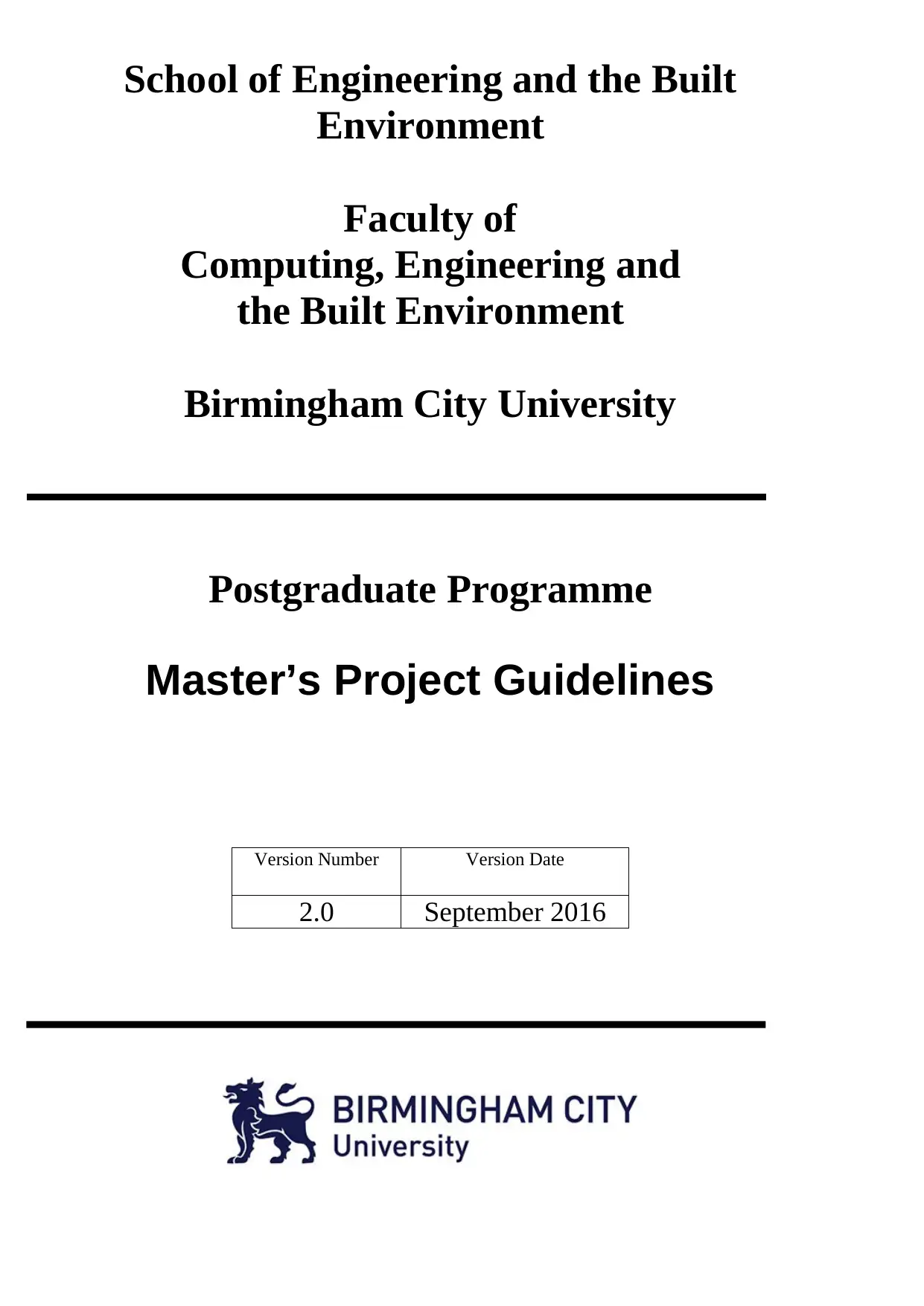
School of Engineering and the Built
Environment
Faculty of
Computing, Engineering and
the Built Environment
Birmingham City University
Postgraduate Programme
Master’s Project Guidelines
Version Number Version Date
2.0 September 2016
Environment
Faculty of
Computing, Engineering and
the Built Environment
Birmingham City University
Postgraduate Programme
Master’s Project Guidelines
Version Number Version Date
2.0 September 2016
Paraphrase This Document
Need a fresh take? Get an instant paraphrase of this document with our AI Paraphraser
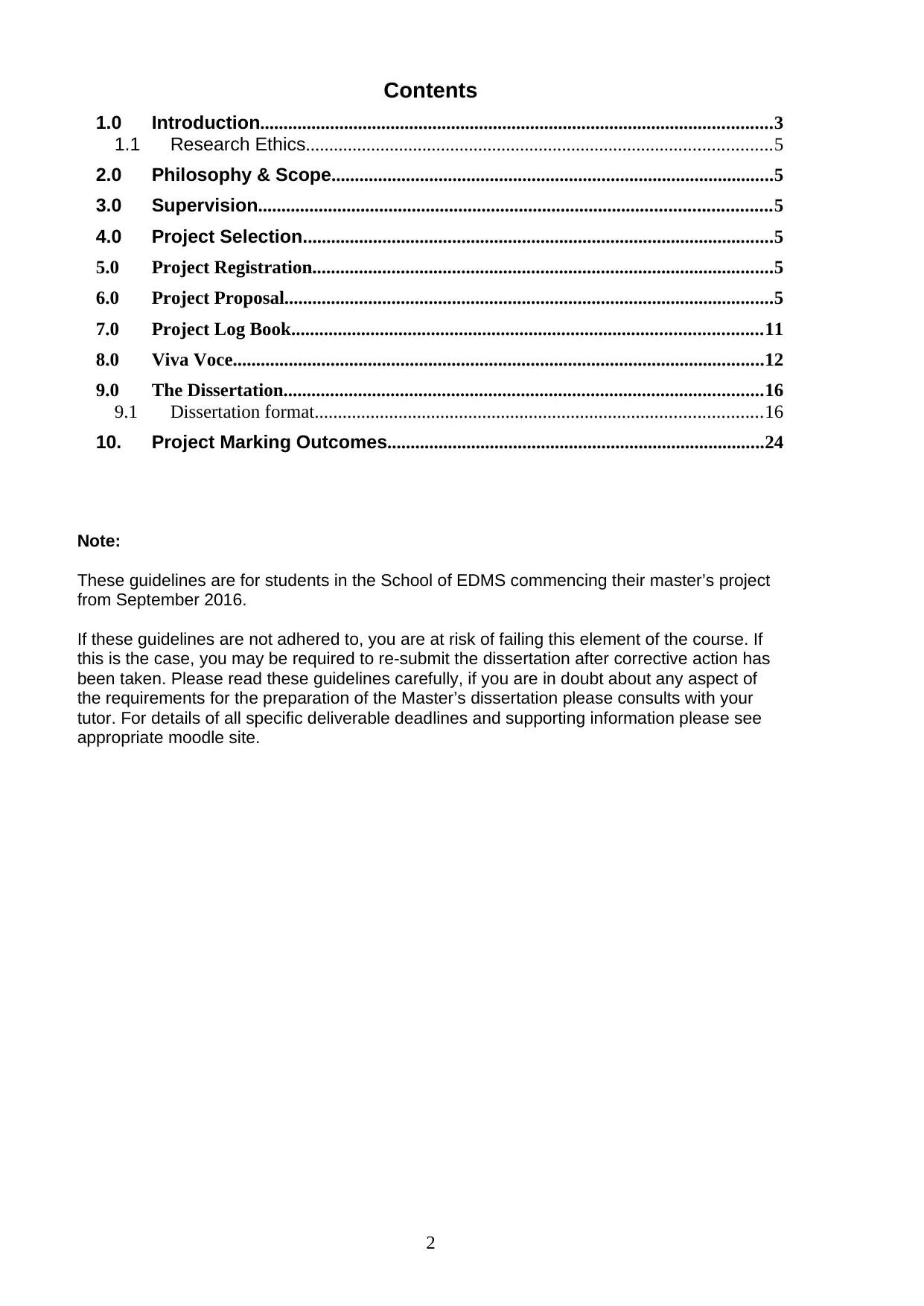
Contents
1.0 Introduction..............................................................................................................3
1.1 Research Ethics....................................................................................................5
2.0 Philosophy & Scope...............................................................................................5
3.0 Supervision..............................................................................................................5
4.0 Project Selection.....................................................................................................5
5.0 Project Registration...................................................................................................5
6.0 Project Proposal.........................................................................................................5
7.0 Project Log Book.....................................................................................................11
8.0 Viva Voce..................................................................................................................12
9.0 The Dissertation.......................................................................................................16
9.1 Dissertation format................................................................................................16
10. Project Marking Outcomes.................................................................................24
Note:
These guidelines are for students in the School of EDMS commencing their master’s project
from September 2016.
If these guidelines are not adhered to, you are at risk of failing this element of the course. If
this is the case, you may be required to re-submit the dissertation after corrective action has
been taken. Please read these guidelines carefully, if you are in doubt about any aspect of
the requirements for the preparation of the Master’s dissertation please consults with your
tutor. For details of all specific deliverable deadlines and supporting information please see
appropriate moodle site.
2
1.0 Introduction..............................................................................................................3
1.1 Research Ethics....................................................................................................5
2.0 Philosophy & Scope...............................................................................................5
3.0 Supervision..............................................................................................................5
4.0 Project Selection.....................................................................................................5
5.0 Project Registration...................................................................................................5
6.0 Project Proposal.........................................................................................................5
7.0 Project Log Book.....................................................................................................11
8.0 Viva Voce..................................................................................................................12
9.0 The Dissertation.......................................................................................................16
9.1 Dissertation format................................................................................................16
10. Project Marking Outcomes.................................................................................24
Note:
These guidelines are for students in the School of EDMS commencing their master’s project
from September 2016.
If these guidelines are not adhered to, you are at risk of failing this element of the course. If
this is the case, you may be required to re-submit the dissertation after corrective action has
been taken. Please read these guidelines carefully, if you are in doubt about any aspect of
the requirements for the preparation of the Master’s dissertation please consults with your
tutor. For details of all specific deliverable deadlines and supporting information please see
appropriate moodle site.
2
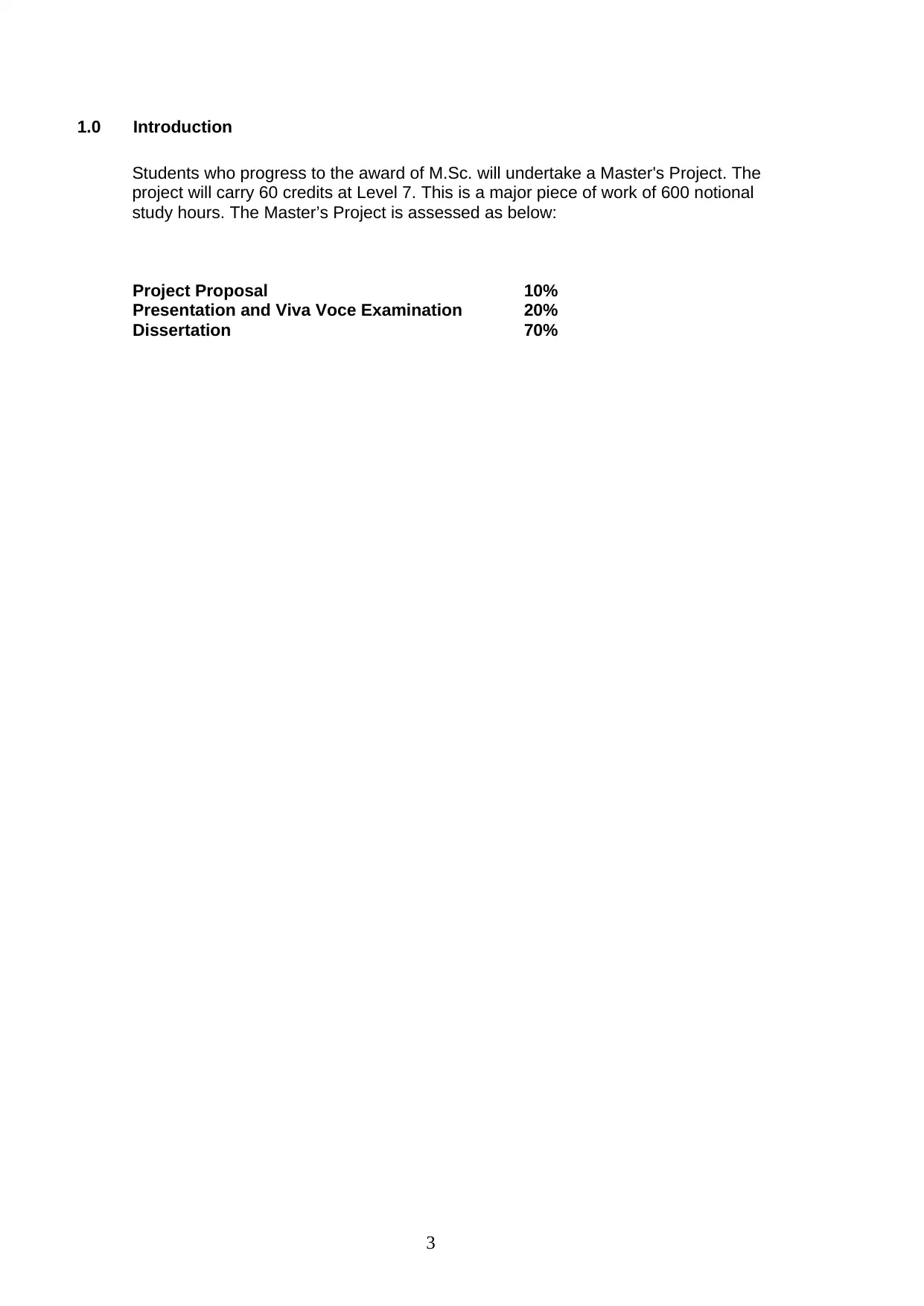
1.0 Introduction
Students who progress to the award of M.Sc. will undertake a Master's Project. The
project will carry 60 credits at Level 7. This is a major piece of work of 600 notional
study hours. The Master’s Project is assessed as below:
Project Proposal 10%
Presentation and Viva Voce Examination 20%
Dissertation 70%
3
Students who progress to the award of M.Sc. will undertake a Master's Project. The
project will carry 60 credits at Level 7. This is a major piece of work of 600 notional
study hours. The Master’s Project is assessed as below:
Project Proposal 10%
Presentation and Viva Voce Examination 20%
Dissertation 70%
3
⊘ This is a preview!⊘
Do you want full access?
Subscribe today to unlock all pages.

Trusted by 1+ million students worldwide
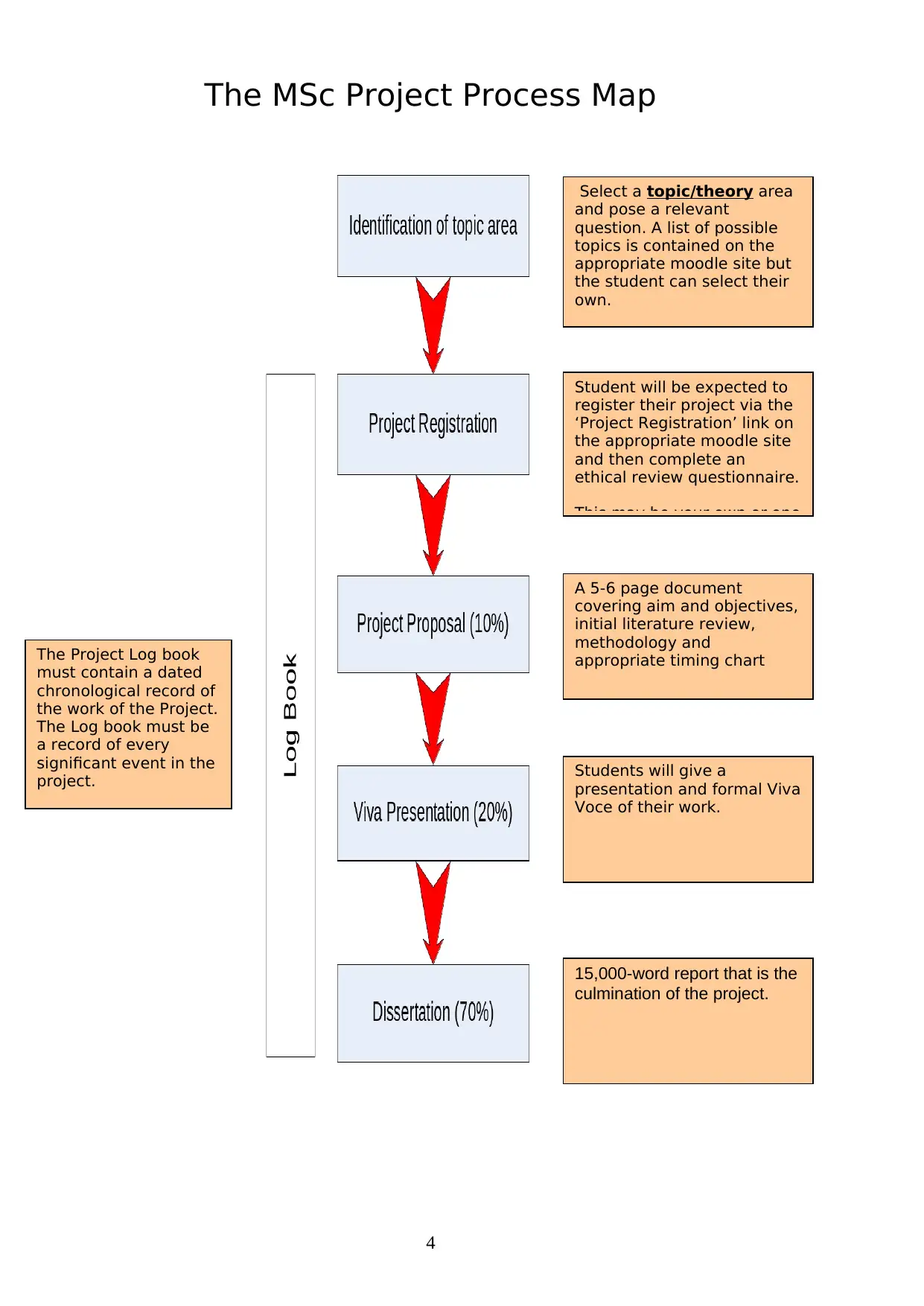
The MSc Project Process Map
Student will be expected to
register their project via the
‘Project Registration’ link on
the appropriate moodle site
and then complete an
ethical review questionnaire.
This may be your own or one
Select a topic/theory area
and pose a relevant
question. A list of possible
topics is contained on the
appropriate moodle site but
the student can select their
own.
A 5-6 page document
covering aim and objectives,
initial literature review,
methodology and
appropriate timing chart
15,000-word report that is the
culmination of the project.
Students will give a
presentation and formal Viva
Voce of their work.
The Project Log book
must contain a dated
chronological record of
the work of the Project.
The Log book must be
a record of every
significant event in the
project.
4
Student will be expected to
register their project via the
‘Project Registration’ link on
the appropriate moodle site
and then complete an
ethical review questionnaire.
This may be your own or one
Select a topic/theory area
and pose a relevant
question. A list of possible
topics is contained on the
appropriate moodle site but
the student can select their
own.
A 5-6 page document
covering aim and objectives,
initial literature review,
methodology and
appropriate timing chart
15,000-word report that is the
culmination of the project.
Students will give a
presentation and formal Viva
Voce of their work.
The Project Log book
must contain a dated
chronological record of
the work of the Project.
The Log book must be
a record of every
significant event in the
project.
4
Paraphrase This Document
Need a fresh take? Get an instant paraphrase of this document with our AI Paraphraser
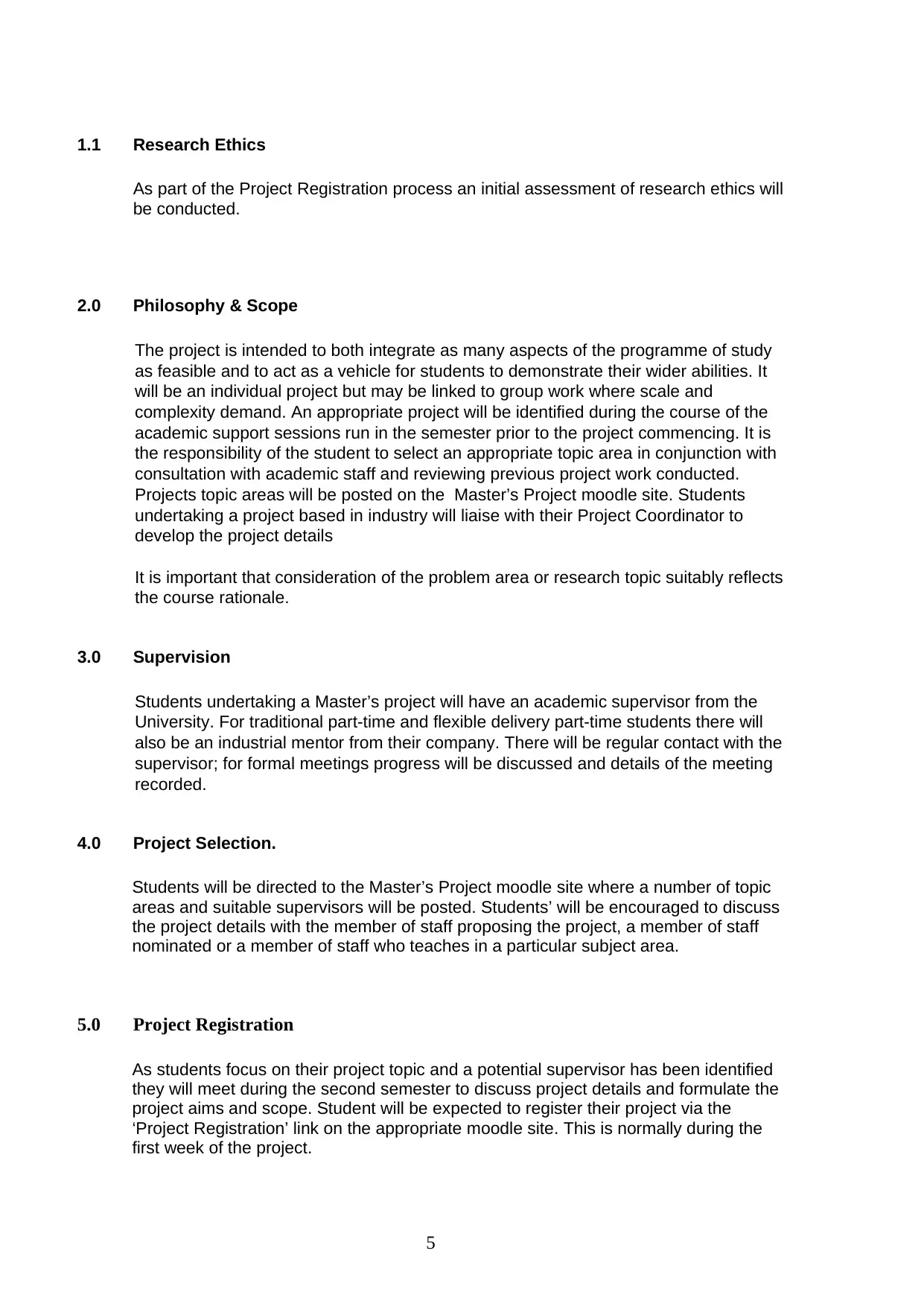
1.1 Research Ethics
As part of the Project Registration process an initial assessment of research ethics will
be conducted.
2.0 Philosophy & Scope
The project is intended to both integrate as many aspects of the programme of study
as feasible and to act as a vehicle for students to demonstrate their wider abilities. It
will be an individual project but may be linked to group work where scale and
complexity demand. An appropriate project will be identified during the course of the
academic support sessions run in the semester prior to the project commencing. It is
the responsibility of the student to select an appropriate topic area in conjunction with
consultation with academic staff and reviewing previous project work conducted.
Projects topic areas will be posted on the Master’s Project moodle site. Students
undertaking a project based in industry will liaise with their Project Coordinator to
develop the project details
It is important that consideration of the problem area or research topic suitably reflects
the course rationale.
3.0 Supervision
Students undertaking a Master’s project will have an academic supervisor from the
University. For traditional part-time and flexible delivery part-time students there will
also be an industrial mentor from their company. There will be regular contact with the
supervisor; for formal meetings progress will be discussed and details of the meeting
recorded.
4.0 Project Selection.
Students will be directed to the Master’s Project moodle site where a number of topic
areas and suitable supervisors will be posted. Students’ will be encouraged to discuss
the project details with the member of staff proposing the project, a member of staff
nominated or a member of staff who teaches in a particular subject area.
5.0 Project Registration
As students focus on their project topic and a potential supervisor has been identified
they will meet during the second semester to discuss project details and formulate the
project aims and scope. Student will be expected to register their project via the
‘Project Registration’ link on the appropriate moodle site. This is normally during the
first week of the project.
5
As part of the Project Registration process an initial assessment of research ethics will
be conducted.
2.0 Philosophy & Scope
The project is intended to both integrate as many aspects of the programme of study
as feasible and to act as a vehicle for students to demonstrate their wider abilities. It
will be an individual project but may be linked to group work where scale and
complexity demand. An appropriate project will be identified during the course of the
academic support sessions run in the semester prior to the project commencing. It is
the responsibility of the student to select an appropriate topic area in conjunction with
consultation with academic staff and reviewing previous project work conducted.
Projects topic areas will be posted on the Master’s Project moodle site. Students
undertaking a project based in industry will liaise with their Project Coordinator to
develop the project details
It is important that consideration of the problem area or research topic suitably reflects
the course rationale.
3.0 Supervision
Students undertaking a Master’s project will have an academic supervisor from the
University. For traditional part-time and flexible delivery part-time students there will
also be an industrial mentor from their company. There will be regular contact with the
supervisor; for formal meetings progress will be discussed and details of the meeting
recorded.
4.0 Project Selection.
Students will be directed to the Master’s Project moodle site where a number of topic
areas and suitable supervisors will be posted. Students’ will be encouraged to discuss
the project details with the member of staff proposing the project, a member of staff
nominated or a member of staff who teaches in a particular subject area.
5.0 Project Registration
As students focus on their project topic and a potential supervisor has been identified
they will meet during the second semester to discuss project details and formulate the
project aims and scope. Student will be expected to register their project via the
‘Project Registration’ link on the appropriate moodle site. This is normally during the
first week of the project.
5
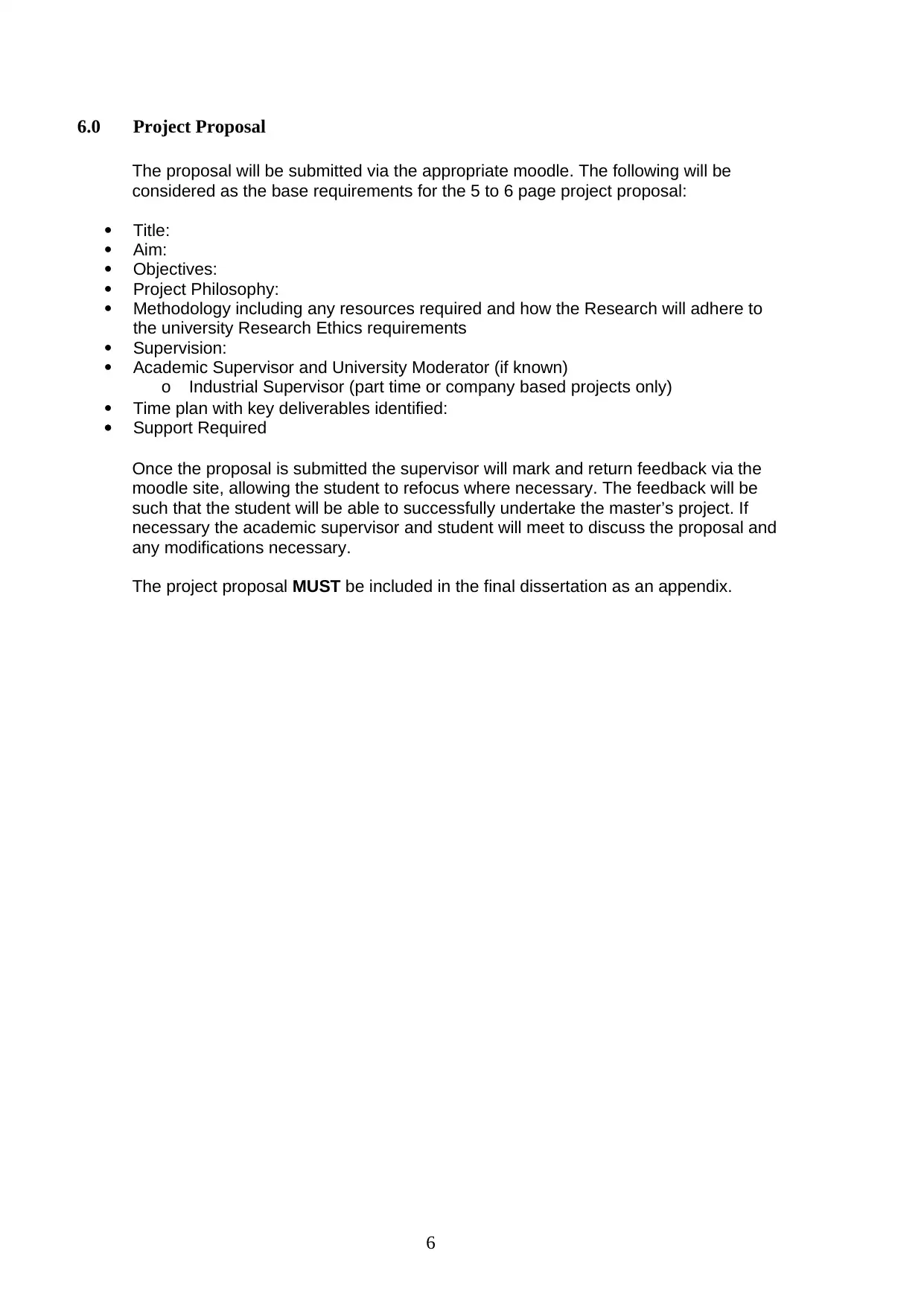
6.0 Project Proposal
The proposal will be submitted via the appropriate moodle. The following will be
considered as the base requirements for the 5 to 6 page project proposal:
Title:
Aim:
Objectives:
Project Philosophy:
Methodology including any resources required and how the Research will adhere to
the university Research Ethics requirements
Supervision:
Academic Supervisor and University Moderator (if known)
o Industrial Supervisor (part time or company based projects only)
Time plan with key deliverables identified:
Support Required
Once the proposal is submitted the supervisor will mark and return feedback via the
moodle site, allowing the student to refocus where necessary. The feedback will be
such that the student will be able to successfully undertake the master’s project. If
necessary the academic supervisor and student will meet to discuss the proposal and
any modifications necessary.
The project proposal MUST be included in the final dissertation as an appendix.
6
The proposal will be submitted via the appropriate moodle. The following will be
considered as the base requirements for the 5 to 6 page project proposal:
Title:
Aim:
Objectives:
Project Philosophy:
Methodology including any resources required and how the Research will adhere to
the university Research Ethics requirements
Supervision:
Academic Supervisor and University Moderator (if known)
o Industrial Supervisor (part time or company based projects only)
Time plan with key deliverables identified:
Support Required
Once the proposal is submitted the supervisor will mark and return feedback via the
moodle site, allowing the student to refocus where necessary. The feedback will be
such that the student will be able to successfully undertake the master’s project. If
necessary the academic supervisor and student will meet to discuss the proposal and
any modifications necessary.
The project proposal MUST be included in the final dissertation as an appendix.
6
⊘ This is a preview!⊘
Do you want full access?
Subscribe today to unlock all pages.

Trusted by 1+ million students worldwide
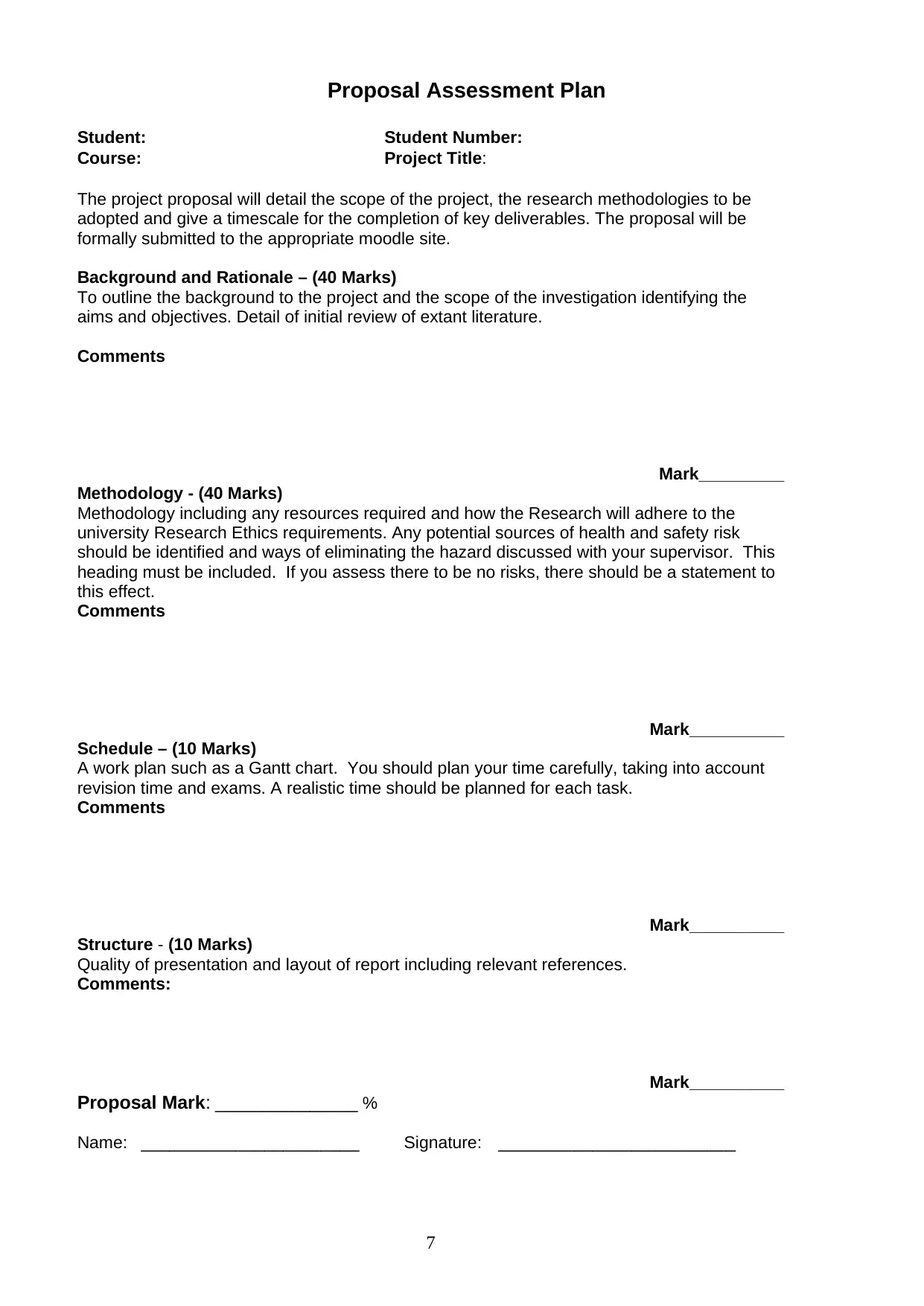
Proposal Assessment Plan
Student: Student Number:
Course: Project Title:
The project proposal will detail the scope of the project, the research methodologies to be
adopted and give a timescale for the completion of key deliverables. The proposal will be
formally submitted to the appropriate moodle site.
Background and Rationale – (40 Marks)
To outline the background to the project and the scope of the investigation identifying the
aims and objectives. Detail of initial review of extant literature.
Comments
Mark_________
Methodology - (40 Marks)
Methodology including any resources required and how the Research will adhere to the
university Research Ethics requirements. Any potential sources of health and safety risk
should be identified and ways of eliminating the hazard discussed with your supervisor. This
heading must be included. If you assess there to be no risks, there should be a statement to
this effect.
Comments
Mark__________
Schedule – (10 Marks)
A work plan such as a Gantt chart. You should plan your time carefully, taking into account
revision time and exams. A realistic time should be planned for each task.
Comments
Mark__________
Structure - (10 Marks)
Quality of presentation and layout of report including relevant references.
Comments:
Mark__________
Proposal Mark: _______________ %
Name: _______________________ Signature: _________________________
7
Student: Student Number:
Course: Project Title:
The project proposal will detail the scope of the project, the research methodologies to be
adopted and give a timescale for the completion of key deliverables. The proposal will be
formally submitted to the appropriate moodle site.
Background and Rationale – (40 Marks)
To outline the background to the project and the scope of the investigation identifying the
aims and objectives. Detail of initial review of extant literature.
Comments
Mark_________
Methodology - (40 Marks)
Methodology including any resources required and how the Research will adhere to the
university Research Ethics requirements. Any potential sources of health and safety risk
should be identified and ways of eliminating the hazard discussed with your supervisor. This
heading must be included. If you assess there to be no risks, there should be a statement to
this effect.
Comments
Mark__________
Schedule – (10 Marks)
A work plan such as a Gantt chart. You should plan your time carefully, taking into account
revision time and exams. A realistic time should be planned for each task.
Comments
Mark__________
Structure - (10 Marks)
Quality of presentation and layout of report including relevant references.
Comments:
Mark__________
Proposal Mark: _______________ %
Name: _______________________ Signature: _________________________
7
Paraphrase This Document
Need a fresh take? Get an instant paraphrase of this document with our AI Paraphraser

Date: _______________________ 1st Marker
8
8
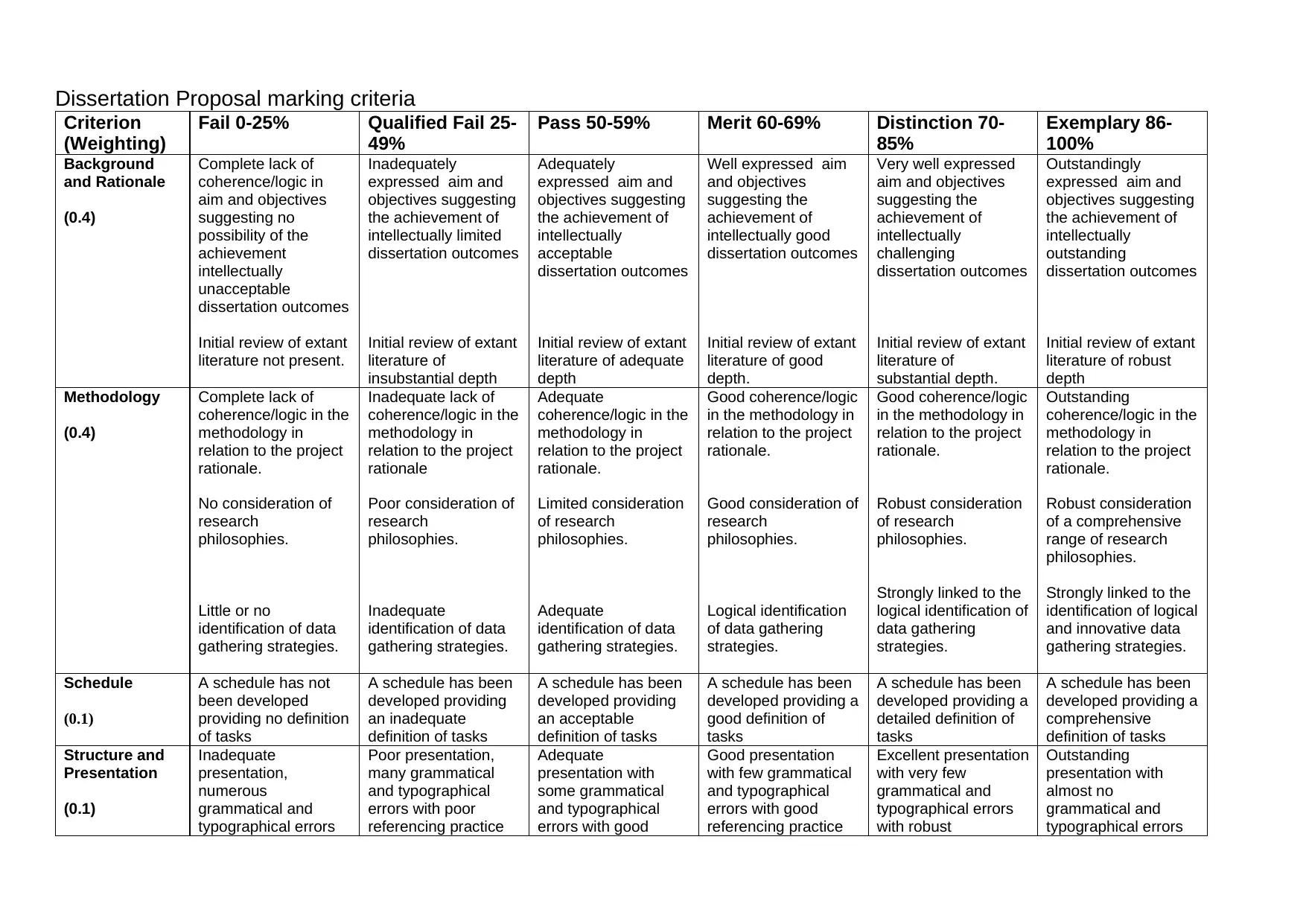
Dissertation Proposal marking criteria
Criterion
(Weighting)
Fail 0-25% Qualified Fail 25-
49%
Pass 50-59% Merit 60-69% Distinction 70-
85%
Exemplary 86-
100%
Background
and Rationale
(0.4)
Complete lack of
coherence/logic in
aim and objectives
suggesting no
possibility of the
achievement
intellectually
unacceptable
dissertation outcomes
Initial review of extant
literature not present.
Inadequately
expressed aim and
objectives suggesting
the achievement of
intellectually limited
dissertation outcomes
Initial review of extant
literature of
insubstantial depth
Adequately
expressed aim and
objectives suggesting
the achievement of
intellectually
acceptable
dissertation outcomes
Initial review of extant
literature of adequate
depth
Well expressed aim
and objectives
suggesting the
achievement of
intellectually good
dissertation outcomes
Initial review of extant
literature of good
depth.
Very well expressed
aim and objectives
suggesting the
achievement of
intellectually
challenging
dissertation outcomes
Initial review of extant
literature of
substantial depth.
Outstandingly
expressed aim and
objectives suggesting
the achievement of
intellectually
outstanding
dissertation outcomes
Initial review of extant
literature of robust
depth
Methodology
(0.4)
Complete lack of
coherence/logic in the
methodology in
relation to the project
rationale.
No consideration of
research
philosophies.
Little or no
identification of data
gathering strategies.
Inadequate lack of
coherence/logic in the
methodology in
relation to the project
rationale
Poor consideration of
research
philosophies.
Inadequate
identification of data
gathering strategies.
Adequate
coherence/logic in the
methodology in
relation to the project
rationale.
Limited consideration
of research
philosophies.
Adequate
identification of data
gathering strategies.
Good coherence/logic
in the methodology in
relation to the project
rationale.
Good consideration of
research
philosophies.
Logical identification
of data gathering
strategies.
Good coherence/logic
in the methodology in
relation to the project
rationale.
Robust consideration
of research
philosophies.
Strongly linked to the
logical identification of
data gathering
strategies.
Outstanding
coherence/logic in the
methodology in
relation to the project
rationale.
Robust consideration
of a comprehensive
range of research
philosophies.
Strongly linked to the
identification of logical
and innovative data
gathering strategies.
Schedule
(0.1)
A schedule has not
been developed
providing no definition
of tasks
A schedule has been
developed providing
an inadequate
definition of tasks
A schedule has been
developed providing
an acceptable
definition of tasks
A schedule has been
developed providing a
good definition of
tasks
A schedule has been
developed providing a
detailed definition of
tasks
A schedule has been
developed providing a
comprehensive
definition of tasks
Structure and
Presentation
(0.1)
Inadequate
presentation,
numerous
grammatical and
typographical errors
Poor presentation,
many grammatical
and typographical
errors with poor
referencing practice
Adequate
presentation with
some grammatical
and typographical
errors with good
Good presentation
with few grammatical
and typographical
errors with good
referencing practice
Excellent presentation
with very few
grammatical and
typographical errors
with robust
Outstanding
presentation with
almost no
grammatical and
typographical errors
Criterion
(Weighting)
Fail 0-25% Qualified Fail 25-
49%
Pass 50-59% Merit 60-69% Distinction 70-
85%
Exemplary 86-
100%
Background
and Rationale
(0.4)
Complete lack of
coherence/logic in
aim and objectives
suggesting no
possibility of the
achievement
intellectually
unacceptable
dissertation outcomes
Initial review of extant
literature not present.
Inadequately
expressed aim and
objectives suggesting
the achievement of
intellectually limited
dissertation outcomes
Initial review of extant
literature of
insubstantial depth
Adequately
expressed aim and
objectives suggesting
the achievement of
intellectually
acceptable
dissertation outcomes
Initial review of extant
literature of adequate
depth
Well expressed aim
and objectives
suggesting the
achievement of
intellectually good
dissertation outcomes
Initial review of extant
literature of good
depth.
Very well expressed
aim and objectives
suggesting the
achievement of
intellectually
challenging
dissertation outcomes
Initial review of extant
literature of
substantial depth.
Outstandingly
expressed aim and
objectives suggesting
the achievement of
intellectually
outstanding
dissertation outcomes
Initial review of extant
literature of robust
depth
Methodology
(0.4)
Complete lack of
coherence/logic in the
methodology in
relation to the project
rationale.
No consideration of
research
philosophies.
Little or no
identification of data
gathering strategies.
Inadequate lack of
coherence/logic in the
methodology in
relation to the project
rationale
Poor consideration of
research
philosophies.
Inadequate
identification of data
gathering strategies.
Adequate
coherence/logic in the
methodology in
relation to the project
rationale.
Limited consideration
of research
philosophies.
Adequate
identification of data
gathering strategies.
Good coherence/logic
in the methodology in
relation to the project
rationale.
Good consideration of
research
philosophies.
Logical identification
of data gathering
strategies.
Good coherence/logic
in the methodology in
relation to the project
rationale.
Robust consideration
of research
philosophies.
Strongly linked to the
logical identification of
data gathering
strategies.
Outstanding
coherence/logic in the
methodology in
relation to the project
rationale.
Robust consideration
of a comprehensive
range of research
philosophies.
Strongly linked to the
identification of logical
and innovative data
gathering strategies.
Schedule
(0.1)
A schedule has not
been developed
providing no definition
of tasks
A schedule has been
developed providing
an inadequate
definition of tasks
A schedule has been
developed providing
an acceptable
definition of tasks
A schedule has been
developed providing a
good definition of
tasks
A schedule has been
developed providing a
detailed definition of
tasks
A schedule has been
developed providing a
comprehensive
definition of tasks
Structure and
Presentation
(0.1)
Inadequate
presentation,
numerous
grammatical and
typographical errors
Poor presentation,
many grammatical
and typographical
errors with poor
referencing practice
Adequate
presentation with
some grammatical
and typographical
errors with good
Good presentation
with few grammatical
and typographical
errors with good
referencing practice
Excellent presentation
with very few
grammatical and
typographical errors
with robust
Outstanding
presentation with
almost no
grammatical and
typographical errors
⊘ This is a preview!⊘
Do you want full access?
Subscribe today to unlock all pages.

Trusted by 1+ million students worldwide
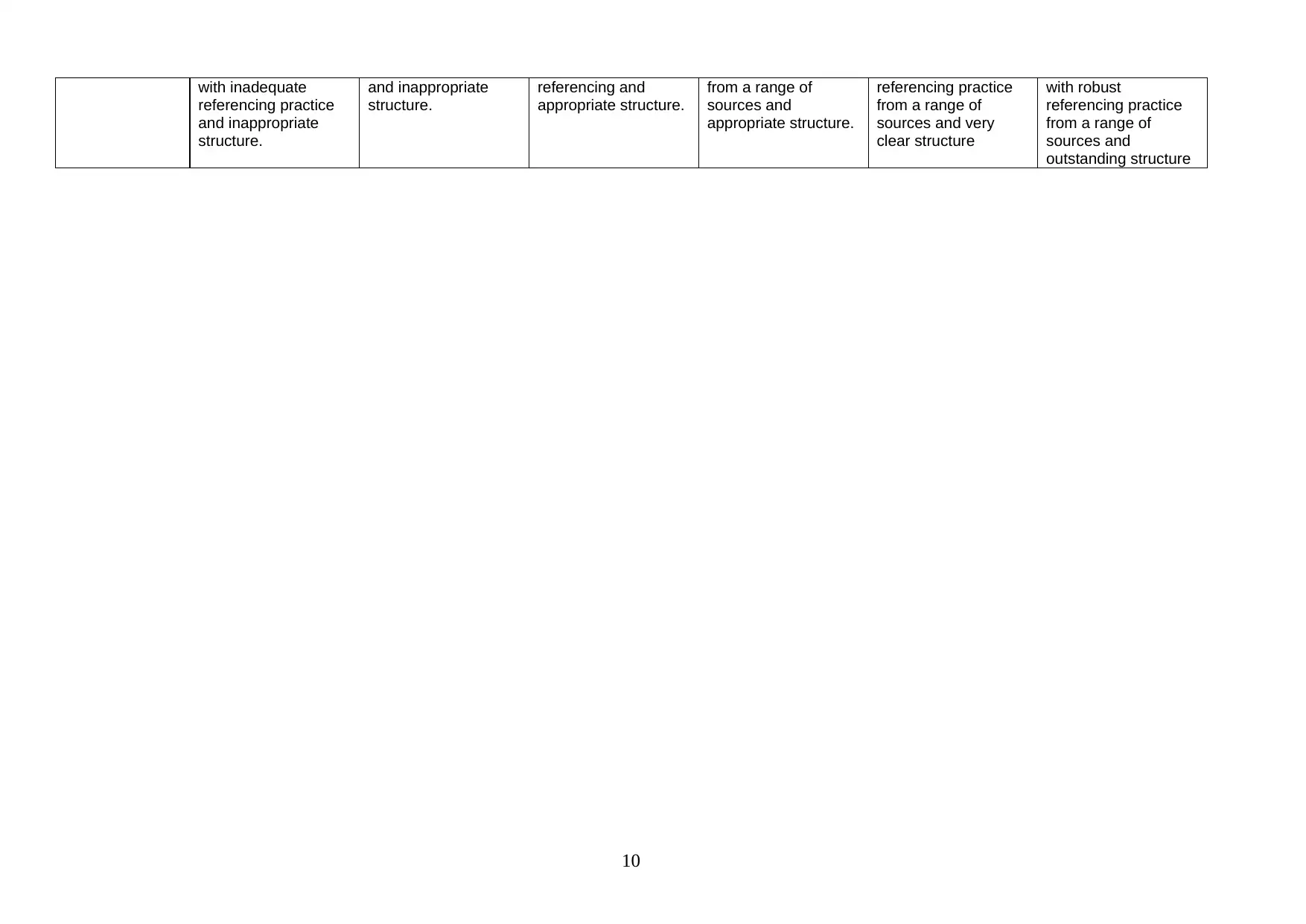
with inadequate
referencing practice
and inappropriate
structure.
and inappropriate
structure.
referencing and
appropriate structure.
from a range of
sources and
appropriate structure.
referencing practice
from a range of
sources and very
clear structure
with robust
referencing practice
from a range of
sources and
outstanding structure
10
referencing practice
and inappropriate
structure.
and inappropriate
structure.
referencing and
appropriate structure.
from a range of
sources and
appropriate structure.
referencing practice
from a range of
sources and very
clear structure
with robust
referencing practice
from a range of
sources and
outstanding structure
10
Paraphrase This Document
Need a fresh take? Get an instant paraphrase of this document with our AI Paraphraser
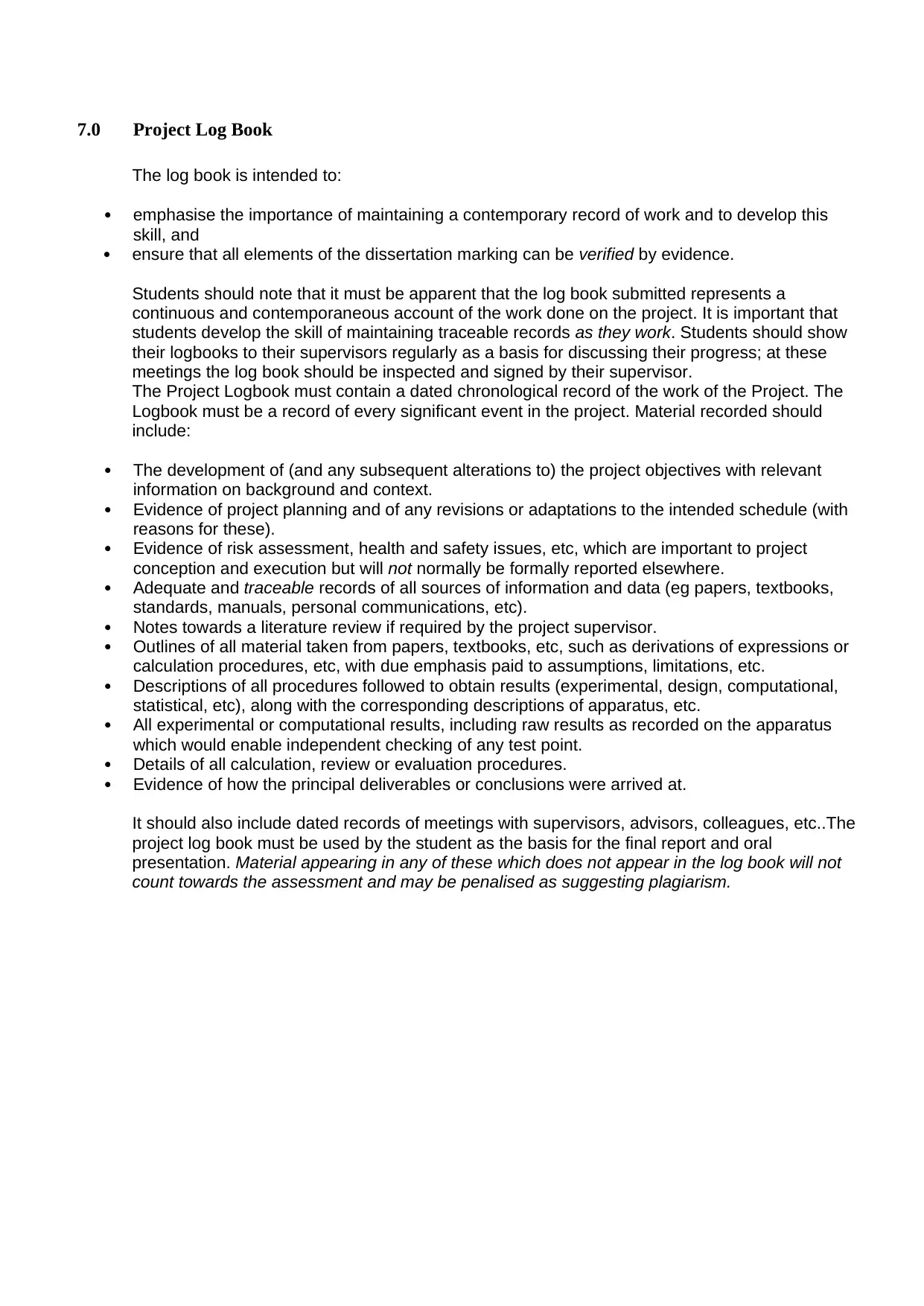
7.0 Project Log Book
The log book is intended to:
emphasise the importance of maintaining a contemporary record of work and to develop this
skill, and
ensure that all elements of the dissertation marking can be verified by evidence.
Students should note that it must be apparent that the log book submitted represents a
continuous and contemporaneous account of the work done on the project. It is important that
students develop the skill of maintaining traceable records as they work. Students should show
their logbooks to their supervisors regularly as a basis for discussing their progress; at these
meetings the log book should be inspected and signed by their supervisor.
The Project Logbook must contain a dated chronological record of the work of the Project. The
Logbook must be a record of every significant event in the project. Material recorded should
include:
The development of (and any subsequent alterations to) the project objectives with relevant
information on background and context.
Evidence of project planning and of any revisions or adaptations to the intended schedule (with
reasons for these).
Evidence of risk assessment, health and safety issues, etc, which are important to project
conception and execution but will not normally be formally reported elsewhere.
Adequate and traceable records of all sources of information and data (eg papers, textbooks,
standards, manuals, personal communications, etc).
Notes towards a literature review if required by the project supervisor.
Outlines of all material taken from papers, textbooks, etc, such as derivations of expressions or
calculation procedures, etc, with due emphasis paid to assumptions, limitations, etc.
Descriptions of all procedures followed to obtain results (experimental, design, computational,
statistical, etc), along with the corresponding descriptions of apparatus, etc.
All experimental or computational results, including raw results as recorded on the apparatus
which would enable independent checking of any test point.
Details of all calculation, review or evaluation procedures.
Evidence of how the principal deliverables or conclusions were arrived at.
It should also include dated records of meetings with supervisors, advisors, colleagues, etc..The
project log book must be used by the student as the basis for the final report and oral
presentation. Material appearing in any of these which does not appear in the log book will not
count towards the assessment and may be penalised as suggesting plagiarism.
The log book is intended to:
emphasise the importance of maintaining a contemporary record of work and to develop this
skill, and
ensure that all elements of the dissertation marking can be verified by evidence.
Students should note that it must be apparent that the log book submitted represents a
continuous and contemporaneous account of the work done on the project. It is important that
students develop the skill of maintaining traceable records as they work. Students should show
their logbooks to their supervisors regularly as a basis for discussing their progress; at these
meetings the log book should be inspected and signed by their supervisor.
The Project Logbook must contain a dated chronological record of the work of the Project. The
Logbook must be a record of every significant event in the project. Material recorded should
include:
The development of (and any subsequent alterations to) the project objectives with relevant
information on background and context.
Evidence of project planning and of any revisions or adaptations to the intended schedule (with
reasons for these).
Evidence of risk assessment, health and safety issues, etc, which are important to project
conception and execution but will not normally be formally reported elsewhere.
Adequate and traceable records of all sources of information and data (eg papers, textbooks,
standards, manuals, personal communications, etc).
Notes towards a literature review if required by the project supervisor.
Outlines of all material taken from papers, textbooks, etc, such as derivations of expressions or
calculation procedures, etc, with due emphasis paid to assumptions, limitations, etc.
Descriptions of all procedures followed to obtain results (experimental, design, computational,
statistical, etc), along with the corresponding descriptions of apparatus, etc.
All experimental or computational results, including raw results as recorded on the apparatus
which would enable independent checking of any test point.
Details of all calculation, review or evaluation procedures.
Evidence of how the principal deliverables or conclusions were arrived at.
It should also include dated records of meetings with supervisors, advisors, colleagues, etc..The
project log book must be used by the student as the basis for the final report and oral
presentation. Material appearing in any of these which does not appear in the log book will not
count towards the assessment and may be penalised as suggesting plagiarism.
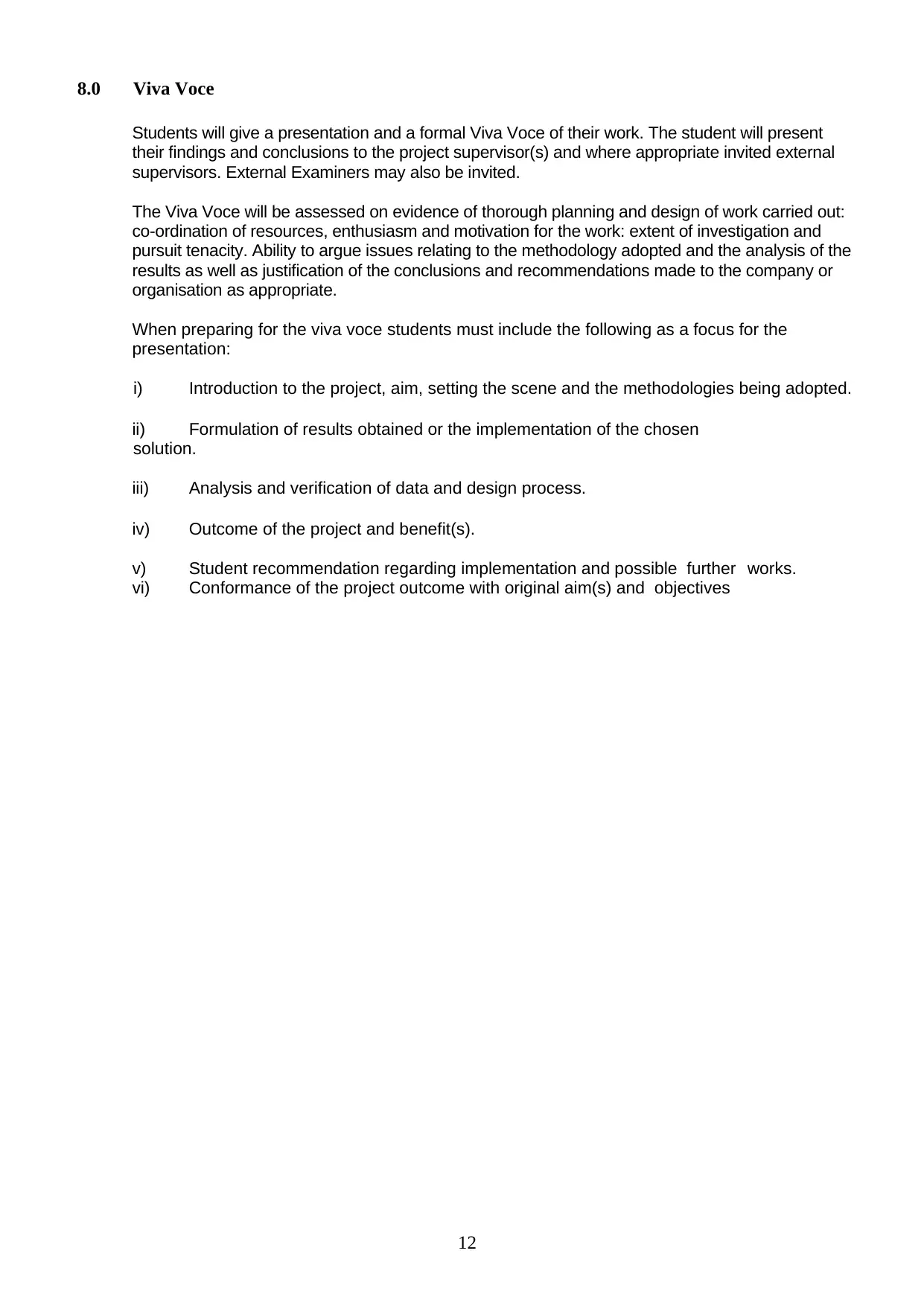
8.0 Viva Voce
Students will give a presentation and a formal Viva Voce of their work. The student will present
their findings and conclusions to the project supervisor(s) and where appropriate invited external
supervisors. External Examiners may also be invited.
The Viva Voce will be assessed on evidence of thorough planning and design of work carried out:
co-ordination of resources, enthusiasm and motivation for the work: extent of investigation and
pursuit tenacity. Ability to argue issues relating to the methodology adopted and the analysis of the
results as well as justification of the conclusions and recommendations made to the company or
organisation as appropriate.
When preparing for the viva voce students must include the following as a focus for the
presentation:
i) Introduction to the project, aim, setting the scene and the methodologies being adopted.
ii) Formulation of results obtained or the implementation of the chosen
solution.
iii) Analysis and verification of data and design process.
iv) Outcome of the project and benefit(s).
v) Student recommendation regarding implementation and possible further works.
vi) Conformance of the project outcome with original aim(s) and objectives
12
Students will give a presentation and a formal Viva Voce of their work. The student will present
their findings and conclusions to the project supervisor(s) and where appropriate invited external
supervisors. External Examiners may also be invited.
The Viva Voce will be assessed on evidence of thorough planning and design of work carried out:
co-ordination of resources, enthusiasm and motivation for the work: extent of investigation and
pursuit tenacity. Ability to argue issues relating to the methodology adopted and the analysis of the
results as well as justification of the conclusions and recommendations made to the company or
organisation as appropriate.
When preparing for the viva voce students must include the following as a focus for the
presentation:
i) Introduction to the project, aim, setting the scene and the methodologies being adopted.
ii) Formulation of results obtained or the implementation of the chosen
solution.
iii) Analysis and verification of data and design process.
iv) Outcome of the project and benefit(s).
v) Student recommendation regarding implementation and possible further works.
vi) Conformance of the project outcome with original aim(s) and objectives
12
⊘ This is a preview!⊘
Do you want full access?
Subscribe today to unlock all pages.

Trusted by 1+ million students worldwide
1 out of 24
Your All-in-One AI-Powered Toolkit for Academic Success.
+13062052269
info@desklib.com
Available 24*7 on WhatsApp / Email
![[object Object]](/_next/static/media/star-bottom.7253800d.svg)
Unlock your academic potential
Copyright © 2020–2026 A2Z Services. All Rights Reserved. Developed and managed by ZUCOL.


